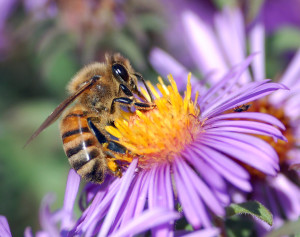Bee-Killing Pesticides Damage Children?s Brain and Nervous System, Says European Authority
The European Food Safety Authority (EFSA) announced on Tuesday that pesticides linked to honey bee deaths worldwide may also damage human nervous systems ?in particular the brain, and recommended that the European Commission lower the guidance levels of acceptable exposure until more research is conducted. This new determination heightens the call to ban the use of these toxic chemicals in the U.S., following the lead of the European Union (EU). EFSA found that two commonly used chemicals ?may adversely affect the development of neurons and brain structure associated with functions such as learning and memory? particularly of children. The recommendation focuses on two chemicals ?acetamiprid and imidacloprid? in a  relatively new class of insecticide called neonicotinoids. Three chemicals in this class were recently placed under a two-year ban in the European Union (EU) for uses on flowering crops known to attract honey bees. The move stems from a recent review of research on rats which found, ?Neonicotinoids may adversely affect human health, especially the developing brain.? Researchers who exposed newborn rats to one of these chemicals ?imidacloprid? found they suffered brain shrinkage, fewer nerve signals controlling movement, and weight loss. Another study on rats found that exposure to the other neonicotinoid ?acetamiprid? caused delayed responses to startling sounds, weight loss, and reduced survival rates. It is clear that neonicotinoids are threat to not only the environment, but humans and animals alike. Click here to sign a petition calling for the banning of these harmful chemicals.
relatively new class of insecticide called neonicotinoids. Three chemicals in this class were recently placed under a two-year ban in the European Union (EU) for uses on flowering crops known to attract honey bees. The move stems from a recent review of research on rats which found, ?Neonicotinoids may adversely affect human health, especially the developing brain.? Researchers who exposed newborn rats to one of these chemicals ?imidacloprid? found they suffered brain shrinkage, fewer nerve signals controlling movement, and weight loss. Another study on rats found that exposure to the other neonicotinoid ?acetamiprid? caused delayed responses to startling sounds, weight loss, and reduced survival rates. It is clear that neonicotinoids are threat to not only the environment, but humans and animals alike. Click here to sign a petition calling for the banning of these harmful chemicals.
Social Media as a Megaphone to Pressure the Food Industry
Throughout the year, parents and advocacy groups have been increasingly using websites and social media as powerful megaphones to create change within the food industry. In the last year, food companies have made several changes to their products as a direct result of media campaigning via consumers.? From Cargill?s decision to  label packages of its ground beef that contain ?pink slime,? to PepsiCo?s decision to replace brominated vegetable oil in Gatorade with a natural additive, corporations are increasingly forced to listen to the demands of consumers. Although companies are reluctant to admit a direct connection between the crusades of consumers, the link seems clear. Knowing that our activism has and can continue to create change within the food industry, let’s continue to keep the pressure on these companies, and enact more progress in the new year.
label packages of its ground beef that contain ?pink slime,? to PepsiCo?s decision to replace brominated vegetable oil in Gatorade with a natural additive, corporations are increasingly forced to listen to the demands of consumers. Although companies are reluctant to admit a direct connection between the crusades of consumers, the link seems clear. Knowing that our activism has and can continue to create change within the food industry, let’s continue to keep the pressure on these companies, and enact more progress in the new year.
The Truth About Fair Trade Coffee?
Does “fair trade” automatically mean you’re getting a better cup of coffee? In a new video,?Vocativ?takes a closer look at what the “fair trade” label really means for consumers and farmers.?Fair trade is a certification that was developed in 1997 to protect farmers of commodities like cocoa, bananas and coffee. The fair trade label is supposed to guarantee that farmers have received a fair price for their goods. Typically the system works by setting a?price floor, which limits how low a commodity can be bought for. Organizations like?Fair Trade USA?and?Fair Trade International?certify products with their stamp of approval, and consumers know they are buying 

Comments are closed.